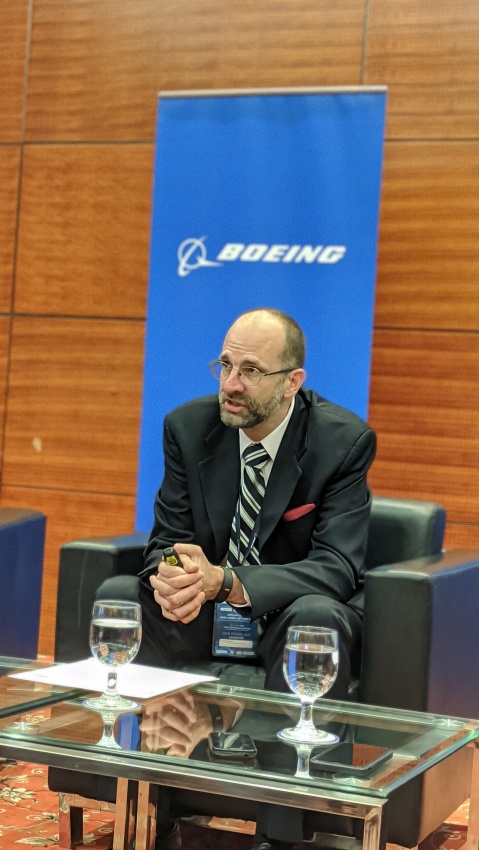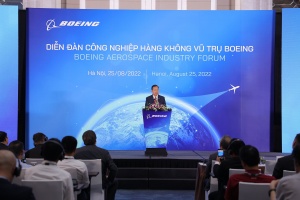Action required for aviation to achieve net-zero commitments
Boeing Commercial Airplanes has outlined a series of policies that will be needed to embrace net zero carbon emissions by 2050.
Thomas Sanderson, the company's product marketing director, made the comments at a media briefing on September 15 on the sidelines of the Vietnam International Aviation Expo VIAE 2022.
He said the future of flight would require airlines to simultaneously pursue every pathway to achieve the net zero target.
"There are four main actions to be taken by the commercial aviation industry between now and 2050. They are fleet renewal, improved operational efficiency, renewable energy and advanced technology," he said.
 |
| Boeing’s media briefing on September 15 |
"We typically assume 20 to 25 years of economic life for commercial aircraft. So by 2050, we would expect every aircraft to have been replaced. In Southeast Asia, we anticipate needing 4,255 aircraft for renewal in the next 20 years, and Vietnam will be integral to that growth," Sanderson said. “We have seen most success when the government, airframers and airlines are aligned, and government policy supports early investment and growth in sustainable technologies until they reach the scale where they become economically competitive.”
Boeing’s latest Commercial Market Outlook estimates a 20 per cent improvement in carbon emissions per passenger with the newest generation aircraft. And that 49 per cent of the aircraft delivered in the next 20 years will be replacements removing less efficient aircraft from the fleet.
 |
| Thomas Sanderson, product marketing director, Boeing Commercial Airplanes |
Renewable energy represents the largest single method to improve the industry's carbon footprint, and the primary step in this direction is sustainable aviation fuel (SAF).
Industry insiders anticipate that to meet industry demands, SAF production between 700 and 1,000 times the current capacity will be needed by 2050. As a result, government policy support and partnership with energy companies in SAF production are key.
Moreover, the future of flight will incorporate the latest digital design, test and production tools, propulsion and systems technology, and different power and energy solutions applied to different market segments and aircraft sizes.
Boeing plans to introduce new aircraft to meet those requirements. For example, the 737 MAX family leverages advanced aerodynamic design and highly efficient engines to reduce fuel use and emissions by 20 per cent and noise footprint by 50 per cent compared to current aircraft.
This means that every year a 737-10 will reduce CO2 emissions by 1.7 million pounds compared to the competition and by 12.5 million pounds compared to the aircraft it replaces.
In terms of operational efficiency, the company will develop services to leverage data for fuel efficiency, help customers optimise flight planning, and provide pilots with real-time weather and traffic information.
As part of this approach, Boeing will continue to advance the safety and viability of other renewable energy sources and their use on aircraft.
 | Boeing eyes supply chain expansion in Vietnam Boeing is planning to seek more suppliers in Vietnam to expand its supply chain network and tap into growing demands. |
 | New planes and routes as aviation picks up With a promising outlook in the post-pandemic era, international aircraft manufacturers are seeking to expand their partnerships in Vietnam’s burgeoning aviation market to tap into its growing demand for aircraft and related tech, as well as to expand their supply chain. |
 | Aerospace groups look to board Boeing production Opportunities are opening up for businesses in Vietnam to join aerospace manufacturing supply chains, adding to its status as the fastest-rising commercial aviation market in the region. |
What the stars mean:
★ Poor ★ ★ Promising ★★★ Good ★★★★ Very good ★★★★★ Exceptional
Related Contents
Latest News
More News
- Trung Nam-Sideros River consortium wins bid for LNG venture (January 30, 2026 | 11:16)
- Vietnam moves towards market-based fuel management with E10 rollout (January 30, 2026 | 11:10)
- Envision Energy, REE Group partner on 128MW wind projects (January 30, 2026 | 10:58)
- Vingroup consults on carbon credits for electric vehicle charging network (January 28, 2026 | 11:04)
- Bac Ai Pumped Storage Hydropower Plant to enter peak construction phase (January 27, 2026 | 08:00)
- ASEAN could scale up sustainable aviation fuel by 2050 (January 24, 2026 | 10:19)
- 64,000 hectares of sea allocated for offshore wind surveys (January 22, 2026 | 20:23)
- EVN secures financing for Quang Trach II LNG power plant (January 17, 2026 | 15:55)
- PC1 teams up with DENZAI on regional wind projects (January 16, 2026 | 21:18)
- Innovation and ESG practices drive green transition in the digital era (January 16, 2026 | 16:51)

 Tag:
Tag:

























 Mobile Version
Mobile Version